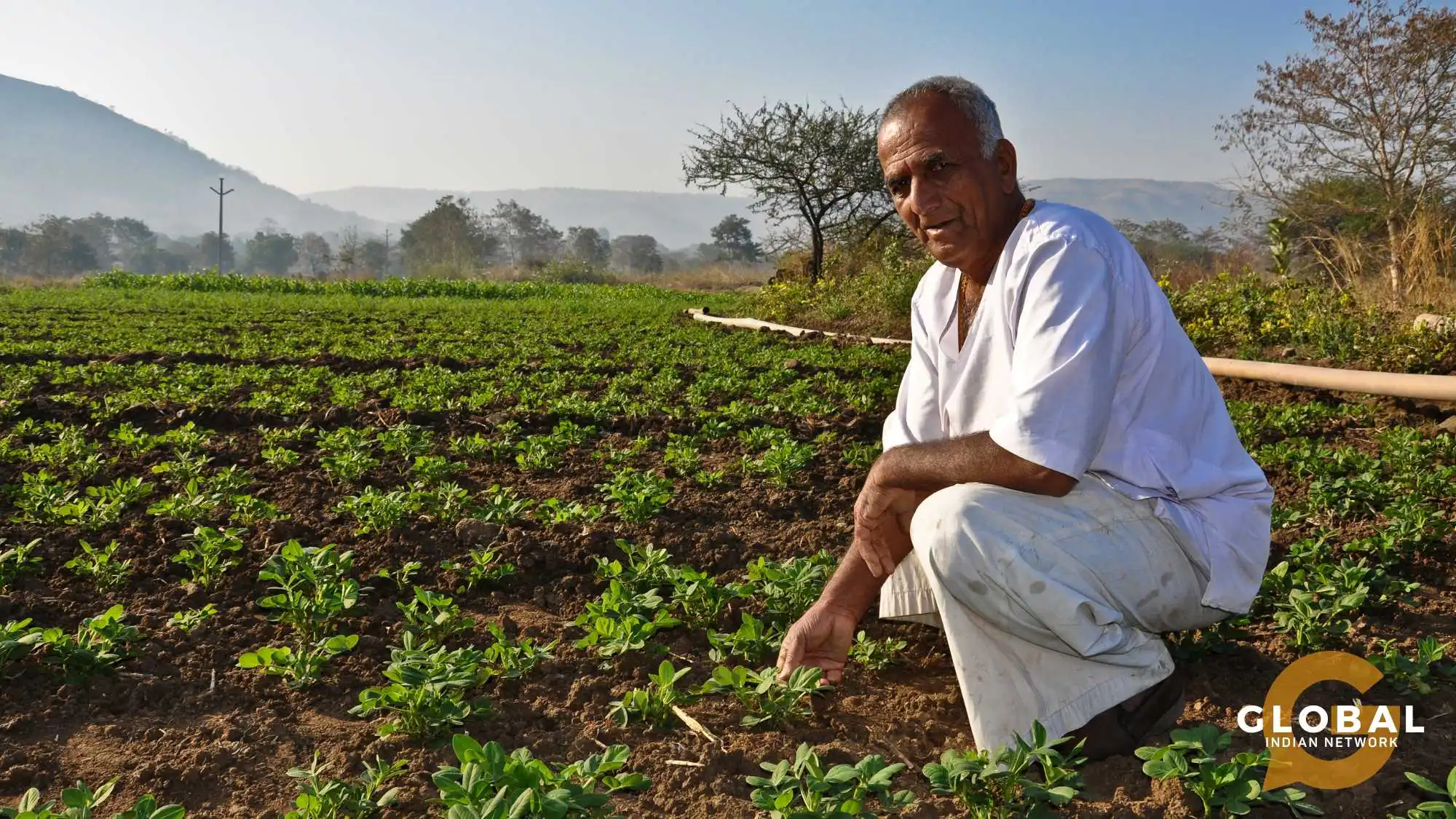The National Mission for Sustainable Agriculture (NMSA) represents a significant stride in India's agricultural policy framework. This mission, embedded within the larger umbrella of the National Action Plan on Climate Change (NAPCC), was designed to ensure sustainable development in agriculture by promoting efficient farming practices, resource management, and adaptive strategies to mitigate the impacts of climate change.
As India continues to face challenges such as soil degradation, water scarcity, and climate change effects, the NMSA guides the agricultural sector towards a more resilient and sustainable future.
Table of Contents
What is the National Mission for Sustainable Agriculture on Indian Farming?
The National Mission for Sustainable Agriculture (NMSA) represents a significant stride in India's agricultural policy framework. This mission, embedded within the larger umbrella of the National Action Plan on Climate Change (NAPCC), was designed to ensure sustainable development in agriculture by promoting efficient farming practices and resource management, adopting comprehensive soil health management systems and other adaptive strategies to mitigate the impacts of climate change. As India continues to face challenges such as soil degradation, water scarcity, and climate change effects, the NMSA guides the agricultural sector towards a more resilient and sustainable future.

Components of the NMSA
Rainfed Area Development: This program emphasizes the development of an area-based approach by integrating farming systems such as crops, livestock, and horticulture. It focuses on improving productivity and income stability for farmers in regions with limited irrigation, promoting crop diversification, and enhancing soil health.
Soil Health Management: SHM aims to enhance soil fertility by promoting balanced nutrient use, organic farming practices, and soil conservation. The Soil Health Card Scheme is a key initiative under this program, providing farmers with information on the nutrient status of their soils and recommending corrective measures.
On-Farm Water Management: This program is dedicated to improving water use efficiency in agriculture. It promotes the adoption of water-saving technologies, such as drip and sprinkler irrigation, and encourages the creation of farm ponds and other water storage structures to support irrigation in water-scarce areas.
Climate Change and Sustainable Agriculture Monitoring, Modeling, and Networking: This initiative addresses the impacts of climate change on agriculture. It involves the collection and analysis of data related to climate change and its effects on farming practices. The program also focuses on developing strategies and models to enhance the resilience of farming systems to climate variability and change.
Impact of the National Mission for Sustainable Agriculture on Indian Farming
One of the primary objectives of the NMSA is to enhance agricultural productivity while ensuring the sustainability of natural resources. The mission has introduced several initiatives to improve the soil health of farming lands, promote water use efficiency, and encourage crop diversification. By focusing on rainfed area development and soil health management, the mission is transforming Indian farming from traditional practices to more sustainable models.
One of the significant achievements of the NMSA is the widespread adoption of the Soil Health Card scheme. This initiative has provided farmers with detailed information about the nutrient status of their soil, enabling them to make informed decisions regarding fertilizer use and crop selection. The emphasis on soil conservation activities and the use of soil fertility maps have further strengthened the foundation of sustainable farming in India. Moreover, the promotion of integrated farming systems has helped maintain soil organic matter and enhance soil carbon storage, which is critical for long-term soil health.
How the National Mission for Sustainable Agriculture is Addressing Food Security
Food security remains a critical concern for India, a nation with an increasing population and limited arable land. The National Mission for Sustainable Agriculture is playing a pivotal role in addressing this challenge by focusing on increasing crop productivity and agricultural productivity through sustainable practices. Along with the National Food Security Mission, the NMSA's approach is holistic, encompassing various aspects of agriculture, from soil management to water resources conservation.
The adoption of sustainable soil health management practices, such as the use of bio-fertilizers and the promotion of organic farming, has led to an increase in crop yields while reducing the dependency on chemical fertilizers. The mission also emphasizes the need for efficient water management through initiatives like the "Per Drop More Crop" approach, which aims to improve water use efficiency in farming. By ensuring that water resources are utilized judiciously and effectively, the NMSA is contributing to the long-term sustainability of food production in the country.
The focus on crop diversification under the NMSA is another critical aspect of food security. By encouraging the cultivation of a variety of crops, the mission reduces the risks associated with crop failure and enhances the resilience of the farming system. This approach not only secures the food supply but also provides farmers with alternative income sources, thereby improving their livelihoods. Further risk mitigation is done by the implementation of supplementary or residual production systems.
Farmer Empowerment Through the National Mission for Sustainable Agriculture
The key mission of the National Mission for Sustainable Agriculture is the empowerment of farmers. The mission recognizes that the capacity of farmers to adopt sustainable practices is crucial for the success of the initiative. Therefore, several programs and schemes have been introduced under the NMSA to build the capacity of farmers and equip them with the necessary skills and knowledge.
One of the key initiatives in this regard is the spread of soil health information through the Soil Health Card scheme. By providing farmers with accurate details on soil fertility and nutrient content, the mission enables them to make informed decisions that enhance their productivity and sustainability. Furthermore, the mission's emphasis on rainfed area development has been instrumental in improving the livelihoods of farmers in rain-dependent regions by introducing sustainable farming practices that are tailored to the specific needs of these areas.
The NMSA also promotes farmer engagement in decision-making processes, ensuring that their voices are heard in the development and implementation of sustainable agricultural policies. This participatory approach not only empowers farmers but also fosters a sense of ownership and responsibility towards sustainable agriculture practices.

Role of Technology in Achieving the Goals of the National Mission for Sustainable Agriculture
The National Mission for Sustainable Agriculture leverages modern technologies to enhance the efficiency of farming practices and ensure the sustainable use of natural resources. One of the significant technological interventions under the NMSA is the use of Geographic Information Systems (GIS) for soil profile studies and the development of soil fertility maps. These tools provide valuable insights into soil characteristics and help in the precise application of nutrients, thereby improving crop yields and maintaining soil health.
The mission also promotes the use of advanced irrigation techniques, such as drip irrigation and sprinkler systems, to improve water use efficiency. These technologies, combined with the "Crop per Drop" approach, have significantly reduced water wastage and enhanced the productivity of water resources. Additionally, the adoption of climate-resilient farming techniques, supported by technological innovations, has enabled farmers to cope with the adverse impacts of climate change.
Moreover, the NMSA encourages the use of digital platforms for the dissemination of knowledge and best practices among farmers. These platforms provide farmers with access to real-time information on weather conditions, pest control measures, and market prices, enabling them to make informed decisions and optimize their farming operations.
How the National Mission for Sustainable Agriculture Addresses Climate Change Challenges
Climate change poses a significant threat to agriculture in India, with its impacts being felt through increased frequency of extreme weather events, changing rainfall patterns, and rising temperatures. The National Mission for Sustainable Agriculture is at the forefront of addressing these challenges by promoting climate-resilient agricultural practices and mitigation strategies.
One of the key components of the NMSA is the promotion of integrated farming systems, which combine crop cultivation with livestock farming and other activities. This approach not only diversifies income sources for farmers but also enhances the resilience of farming systems to climate change. For instance, integrating livestock farming with crop production can help maintain soil fertility through the use of organic manure, thereby reducing the dependency on chemical fertilizers and enhancing soil health.
The mission also emphasizes the importance of water conservation and efficient water management in the face of climate change. Initiatives such as farm pond construction and the promotion of rainwater harvesting techniques are crucial in ensuring the availability of water during dry seasons. Additionally, the NMSA supports the plantation of tree species that are well-suited to local climatic conditions, which helps in carbon sequestration and contributes to climate change mitigation.
Furthermore, the mission's focus on crop diversification and the adoption of climate-resilient crop varieties play a vital role in reducing the risks associated with climate variability. By promoting the cultivation of crops that are tolerant to drought, floods, and other climatic stresses, the NMSA ensures the stability of food production even in the face of changing climate patterns.
ALSO READ:
- Opportunities and Challenges Associated with Sustainable Agriculture
- Maximizing the Economic Impact of Sustainable Agriculture
- Agricultural Entrepreneurship: A Sustainable Path to Rural Development
- Sustainable Livelihood Program: A Blueprint for Rural Transformation
Conclusion
The National Mission for Sustainable Agriculture is shaping the future of Indian agriculture by promoting sustainable practices that enhance productivity, conserve natural resources, and address the challenges posed by climate change. Through initiatives such as the Soil Health Card scheme, rainfed area development, and the promotion of integrated farming systems, the mission is to empower farmers to adopt sustainable practices that ensure the long-term sustainability of agriculture in India. As the country continues to grapple with the impacts of climate change and the need for food security, the NMSA stands as a vital component of India's agricultural strategy, guiding the sector towards a more resilient and sustainable future.

FAQs
What is the Aim of Sustainable Agriculture?
Sustainable agriculture aims to enhance agricultural productivity while preserving natural resources, maintaining ecological balance, and ensuring long-term food security. It focuses on using eco-friendly farming practices, improving soil health, conserving water, and adapting to climate change.
What is the National Mission of Sustainability?
This mission aims to integrate sustainability into various sectors by promoting resource efficiency, reducing carbon footprints, and encouraging green technologies. It seeks to ensure sustainable development through climate-resilient practices and conservation of natural resources.
What is the National Mission for Sustainable Agriculture in India?
The National Mission for Sustainable Agriculture (NMSA) in India aims to promote sustainable farming practices by focusing on soil health management, water use efficiency, climate-resilient agriculture, and the development of rainfed areas. It seeks to improve agricultural productivity while addressing environmental challenges.










[…] systems are regarded as the backbone of sustainable agriculture with their wide range of agricultural practices that are customized to local conditions, resource […]